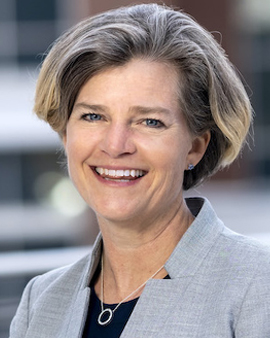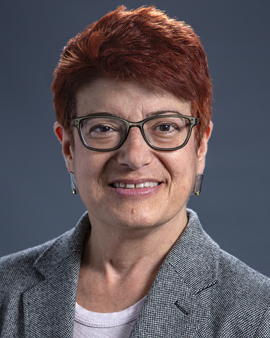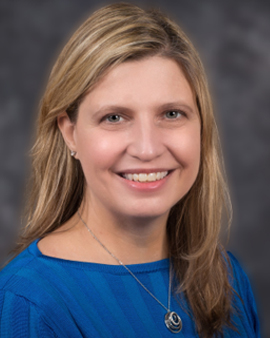ELAM Graduates See Success in New Appointments
December 22, 2021
 Julie Story Byerley, MD, MPH, ELAM ’16
Julie Story Byerley, MD, MPH, ELAM ’16
For more than 25 years, the Executive Leadership in Academic Medicine® (ELAM) program has been helping women develop the professional and personal skills to lead in academic medicine and health care. ELAM graduates, known as ELUMs, now number over 1,200. In 2021, a remarkable 11 of the program’s alumnae were appointed deans or interim deans of medical schools. Three of these ELUMs shared about their experience with the program and its importance in academic medicine.
Julie Story Byerley, MD, MPH, ELAM ’16, has been appointed president and dean of Geisinger Commonwealth School of Medicine, and executive vice president and chief academic officer for Geisinger Health, effective January 1, 2022. She comes to Geisinger from UNC School of Medicine, where she was vice dean for academic affairs; she has also served as interim dean of the UNC Adams School of Dentistry since January 2021.
 Carolyn C. Meltzer, MD, ELAM ’03
Carolyn C. Meltzer, MD, ELAM ’03
Carolyn C. Meltzer, MD, ELAM ’03, is the William P. Timmie Professor and Chair of Radiology & Imaging Sciences; executive associate dean, Faculty Academic Advancement, Leadership & Inclusion; and chief diversity officer for Emory University School of Medicine. Starting March 1, 2022, she will be dean of the Keck School of Medicine, the May S. and John H. Hooval, MD Chair of Medicine; and professor of radiology at the University of Southern California.
Julie G. Pilitsis, MD, PhD, MBA, ELAM ’21, is currently professor and chair of the Department of Neuroscience and Experimental Therapeutics, and professor and division chief of neurosurgery in the Department of Neurosurgery at Albany Medical College in New York. She will become dean and vice president of medical affairs for the Charles E. Schmidt College of Medicine of Florida Atlantic University on February 14, 2022.
 Julie Pilitsis, MD, PhD, MBA, ELAM ’21
Julie Pilitsis, MD, PhD, MBA, ELAM ’21
A Critical Curriculum
When asked what drew her to ELAM’s curriculum, Meltzer said, “I was greatly interested in strengthening my leader toolkit.” She went on to add that ELAM “opened my eyes to leadership as an area of scholarly work and continuous learning.” Byerley was similarly interested in ELAM’s “outstanding reputation of preparing women to lead in academic medicine,” noting that her leadership skills in the area of finance were particularly strengthened through ELAM. The finance component of the curriculum also made the program especially valuable to Pilitsis, who completed her fellowship during the pandemic. Fellows complete an exercise that involves overhauling the budget for a struggling fictional medical school. She found participating in this project, especially at a time when many schools continue to struggle, both timely and poignant.
Making Connections
Each ELUM noted that the opportunity for networking, both during and after the fellowship, was a key benefit of ELAM. When asked why she applied to the program, Meltzer cited “a lifelong network of colleagues and friends from whom I continuously draw wisdom and strength” as an important benefit of the program. Byerley concurred, stating, “The program allowed me the opportunity to share ideas with similarly talented people, and benefit from their feedback and friendship.” Pilitsis added that one of the most important outcomes of her time at ELAM was the opportunity for fellows to make connections to “a rich repository of ELUMs, not just from your class, but with other classes.”
The importance of the program’s Learning Communities (LCs) — the smaller groups of six fellows who are assigned to work through aspects of the program together — was also a common theme for these ELUMs. Meltzer had fond memories of drinking wine and sharing stories with her LC on the rooftop of the learning center during her fellowship year. Byerley recalled commiserating with her LC about often being the youngest person in a room, in addition to being in the minority as a woman. Together the group developed the mantra “You’re not as young as you think you are,” and Byerley still reminds herself of that at times. Pilitsis, having gone through the program entirely online, cited her LC’s choice to meet in person in the Poconos for the final session as one of her favorite memories of her time with ELAM. “We rented an Airbnb and it was super fun to be together after getting to know each other and developing these close bonds, never having met live,” she recounted.
Making the Professional Personal
According to the ELUMs, the program offered benefits to other areas of their lives. Pilitsis shared that the program provided her with new, lifelong friendships, noting that this was particularly valuable as many relationships outside of her family have been harder to maintain due to the pandemic. She also found the program’s focus on “making sure you're prioritizing what you want to prioritize, to the degree you want to prioritize it” particularly helpful during the pandemic, when work-life distinctions fell away for many busy professionals. “It helped me set some boundaries,” she said. Byerley agreed that the program helped clarify her own priorities, while illuminating her strengths and weaknesses, adding, “Gaining better insight into who I am has made me a more content person in all facets of my life.”
The Importance of ELAM
The ELAM program aims to increase the number of women in leadership in academic medicine, and these three former fellows stressed why that matters. Byerley sees her role as a female leader as impactful to both her organization and the communities it serves. She said, “The more diverse our leaders are, the better we will engage with our communities, which are more and more diverse. What I hope to accomplish as a dean is caring for the patients that we serve, but also caring for the faculty, staff and learners.”
Pilitsis noted that in her specialty of neurosurgery, she has always been in the minority, since only about 10% of neurosurgeons in academic medicine are women. She added, however, that “no matter what the specialty, when you get up to professor or chair level, you're also looking at numbers like that. Realizing all the barriers that exist and learning ways people have gotten around those barriers are really important discussion points.”
Meltzer stated, “Without critical and equitable representation of women in the highest levels of our field, systemic and deeply embedded institutional bias will continue to suppress progress and innovation across our missions.”
Looking Back to Look Ahead
The ELUMs also shared advice that they would have given to their younger selves at the start of their careers. “I would advise my younger self to have greater confidence in my abilities, but I don’t think it would have worked. It takes a community such as ELAM,” said Meltzer.
Pilitsis said that skills that have served her well as a neurosurgeon haven’t always translated as well to leadership: “No one has ever accused me of being patient. The surgeon in me wants to power through and make a decision. That may work in the OR, but it doesn't necessarily work elsewhere. I have learned that it's better to consider lots of ideas, find consensus and achieve buy-in to obtain a better product at the end.”
Looking back, Byerley wished she could tell her younger self to broaden the possibilities she considered for her career. “My vision of the future for me early in my career was much narrower. I am thrilled with how my career has developed, but I feel that if I had to do it over, I would encourage my young self to consider a broader range. I might have done things differently to make me better prepared for the possibilities that exist.”
To learn more about the ELAM program, visit the website or email elamprogram@drexel.edu.